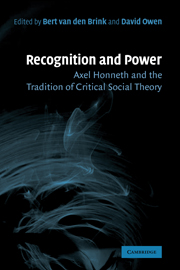Book contents
- Frontmatter
- Contents
- List of Figures and Tables
- Contributors
- Acknowledgments
- 1 Introduction
- PART I PHILOSOPHICAL APPROACHES TO RECOGNITION
- 2 Analyzing Recognition: Identification, Acknowledgement, and Recognitive Attitudes towards Persons
- 3 Recognition and Reconciliation: Actualized Agency in Hegel's Jena Phenomenology
- 4 Damaged Life: Power and Recognition in Adorno's Ethics
- 5 The Potential and the Actual: Mead, Honneth, and the “I”
- PART II RECOGNITION AND POWER IN SOCIAL THEORY
- PART III RECOGNITION AND POWER IN POLITICAL THEORY
- PART IV AXEL HONNETH ON RECOGNITION AND POWER
- Bibliography
- Index
2 - Analyzing Recognition: Identification, Acknowledgement, and Recognitive Attitudes towards Persons
Published online by Cambridge University Press: 24 July 2009
- Frontmatter
- Contents
- List of Figures and Tables
- Contributors
- Acknowledgments
- 1 Introduction
- PART I PHILOSOPHICAL APPROACHES TO RECOGNITION
- 2 Analyzing Recognition: Identification, Acknowledgement, and Recognitive Attitudes towards Persons
- 3 Recognition and Reconciliation: Actualized Agency in Hegel's Jena Phenomenology
- 4 Damaged Life: Power and Recognition in Adorno's Ethics
- 5 The Potential and the Actual: Mead, Honneth, and the “I”
- PART II RECOGNITION AND POWER IN SOCIAL THEORY
- PART III RECOGNITION AND POWER IN POLITICAL THEORY
- PART IV AXEL HONNETH ON RECOGNITION AND POWER
- Bibliography
- Index
Summary
There is a wide consensus today that ‘recognition’ is something that we need a clear grasp of in order to understand the dynamics of political struggles and, perhaps, the constitution and dynamics of social reality more generally. Yet the discussions on recognition have so far often been conceptually rather inexplicit, in the sense that the key concepts have remained largely unexplicated or undefined. Since the English word ‘recognition’ is far from unambiguous, it is possible, and to our mind also actually the case, that different authors have meant different things with this word.
In what follows, we will make a number of conceptual distinctions and clarificatory proposals that are intended to bring to more sharply focus the field of phenomena that are being discussed under the catchword ‘recognition.’ This is meant to serve a dual purpose: to suggest a number of distinctions that are of help in formulating rival views, and to propose what strikes us as the best overall position formulated in terms of those distinctions.
Our proposals are meant to be, by and large, compatible with Axel Honneth's work on recognition, which to us is the most ambitious and differentiated account of recognition available. Where we propose something that seems to us to be in compatible with Honneth's explicit formulations, we indicate it in the footnotes.
- Type
- Chapter
- Information
- Recognition and PowerAxel Honneth and the Tradition of Critical Social Theory, pp. 33 - 56Publisher: Cambridge University PressPrint publication year: 2007
- 43
- Cited by



